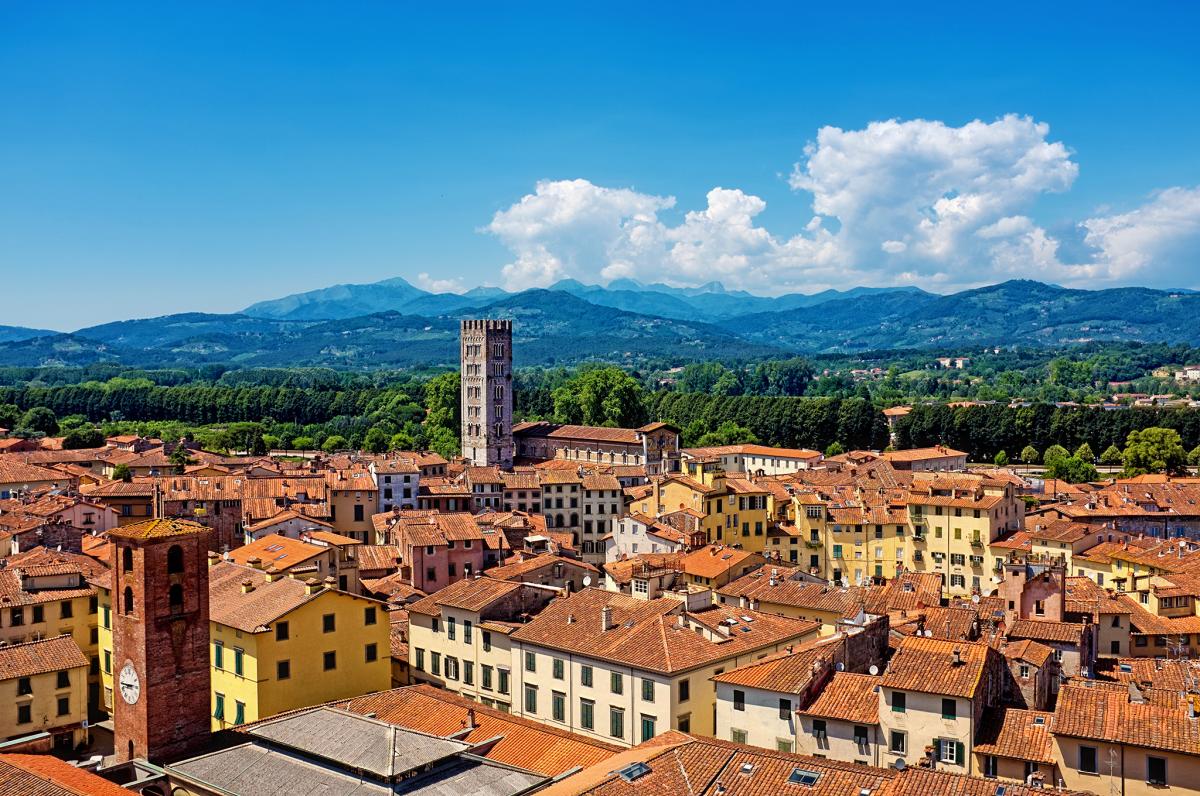




 29 July 2014
29 July 2014
 Caterina Pomini
Caterina Pomini
 7789
7789
The old town has preserved the rectangular Roman plan and traces of an amphitheatre can still be noticed in its famous Piazza dell'Anfiteatro; Piazza San Michele, where the wonderful Church of San Michele in Foro now stands, lies on the site of the ancient forum. Being situated at the junction of roads to Parma, Luni, Florence, Pisa and Rome, Lucca was apparently a wealthy city and was also an early episcopal see. After 476 AD, the city was governed successively by the Goths, the Byzantines and the Lombards; the Frankish counts replaced the Lombard dukes after 774.
Lucca also commanded the Via Francigena (the famous pilgrimage route running from France to Rome); however, it became even more prosperous in the 11th century thanks to the silk trade. When Matilde di Canossa died without heirs in 1115, the city began to constitute itself as an independent commune and despite a series of conflicts with its powerful neighbours and noble houses, it maintained its independence for almost 500 years until Napoleon installed Elisa Baciocchi as “Queen of Etruria” (1805-1814). In 1815, the Congress of Vienna assigned Lucca to Maria Luisa of Spain, the city passed in 1824 to her son Charles Louis of Bourbon-Parma; thirty-six years later, Lucca joined the Kingdom of Italy.
Particularly appreciated for its 16th century intact walls with huge gates and ramparts, Lucca hides an extraordinary amount of Medieval and Renaissance jewels; because of the overwhelming number of religious buildings, it is also known as the “City of 100 Churches”. Small enough to walk around on foot, it is the perfect destination for a city break as there is such a variety of sights and activities on offer. You can't miss Piazza dell'Anfiteatro, built in the Middle Ages on the ruins of the Roman amphitheatre: besides being beautiful, it also boasts cozy little restaurants, tiny cafes, local shops and occasionally outdoor markets. Climb 130 steps up the Guinigi Tower: you will enjoy breathtaking views over the city roofs. Piazza Napoleone is the heart of Lucca's political power and is home to the Ducal Palace; every July, one of the most important music festivals in Italy – the Lucca Summer Festival – takes place here.
Visit St Martin's Cathedral: Lucca's main church was begun in 1063; however, the nave and the transepts were rebuilt in the 14th century. Look for the mysterious labyrinth and the Latin inscription both embedded in the right pillar of the portico: “this is the labyrinth built by Dedalus of Crete; all who entered therein were lost, save Theseus, thanks to Ariadne's thread”. Located on Via Fillungo, the Clock Tower is the tallest tower in Lucca and is linked to the legend of Lucida Mansi, who is said to have sold her soul to the Devil in order to remain young and attractive... The Church of San Michele in Foro, dedicated to Saint Michael, has an astonishingly beautiful façade and a statue of the Archangel on its top. Other points of interest include: Palazzo Pfanner (where some parts of “Portrait of a Lady” starring Nicole Kidman, John Malkovich and Viggo Mortensen were shot); Casa Puccini (where the unforgettable Italian composer was born in 1858) and the Orto Botanico Comunale di Lucca (a splendid botanical garden established in 1820 by Napoleon's second wife, the Duchess of Parma).
Yummy Lucca
We recommend you grab some dinner at Cantine Bernardini (Via del Suffragio, 7), the food is delicious and the atmosphere is wonderful; after dinner, you can ask the owner to tell you about the ghost who inhabits the cellars, a centuries-old entity who was probably imprisoned there a long, long time ago...
Events and festivals
Besides the Lucca Summer Festival, the city hosts the annual Lucca Comics & Games (Europe's largest festival for comics and related subjects) and, every year in November, the Lucca Film Festival.
Ciao Florence Tours and Travels organizes full day tours to Lucca and Pisa with Buccellato tasting, a traditional Lucchese cake made with flour, eggs, aniseed and raisins. If you are visiting Florence and you feel like going on a group tour to Lucca and Pisa, contact www.ciaoflorence.it for details.
THIS SECTION
IS UNDER CONSTRUCTION